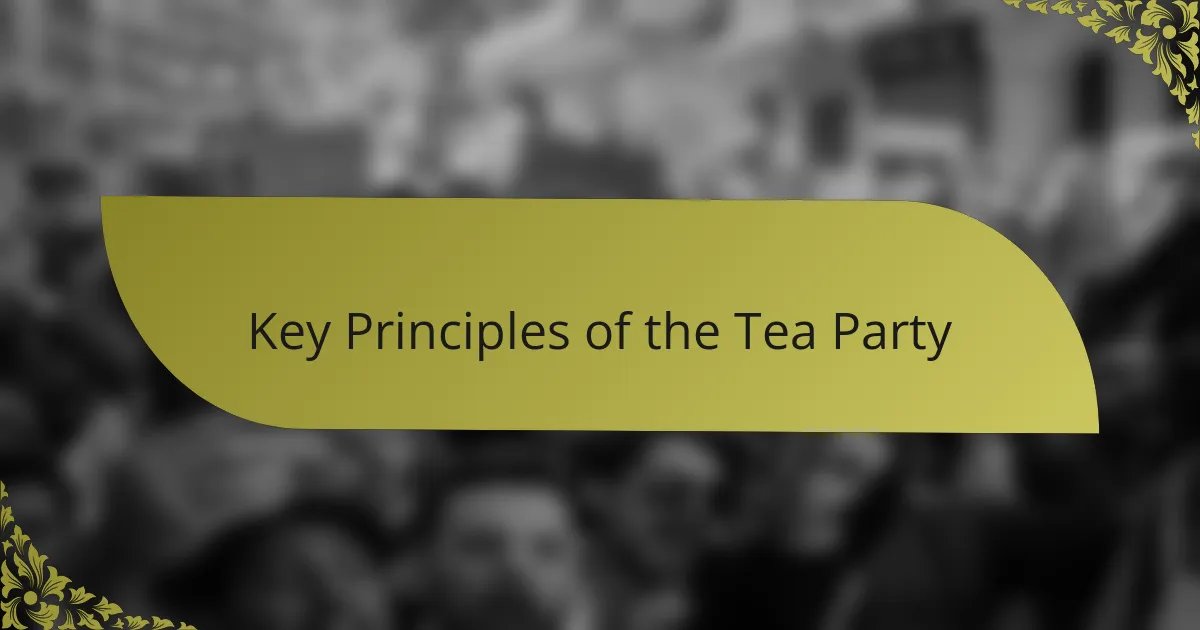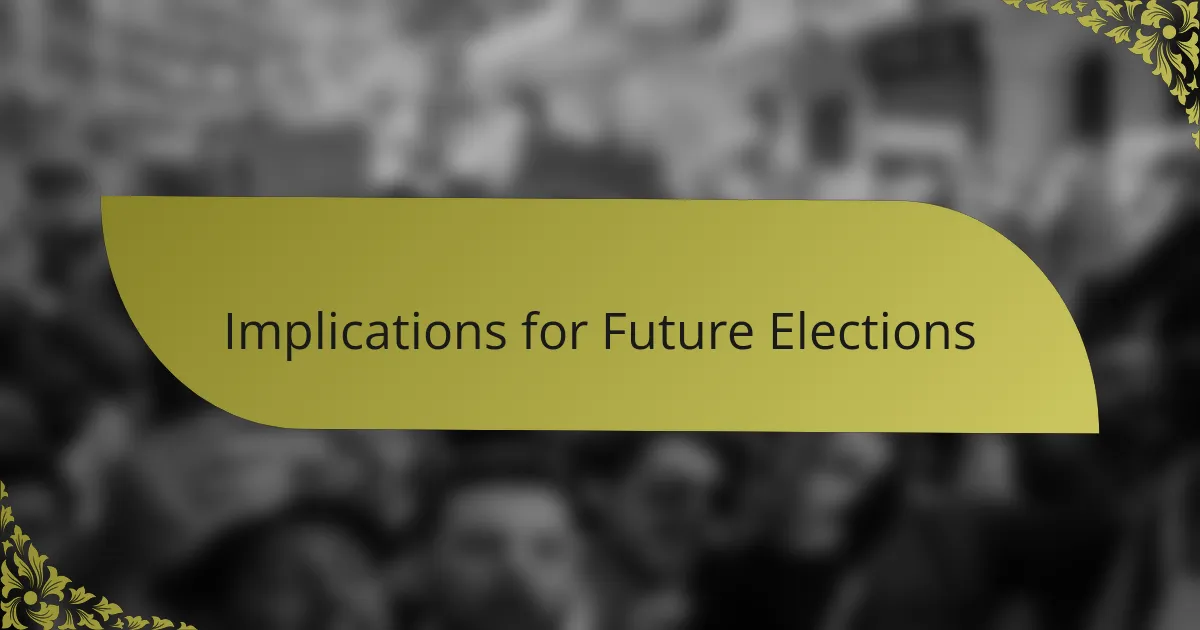Key takeaways
- The Tea Party movement began in 2009, advocating for limited government and fiscal responsibility, attracting conservatives, libertarians, and engaged citizens.
- In Louisiana, the movement mobilized grassroots support, significantly impacting electoral outcomes and encouraging political engagement at the local level.
- Key principles include adherence to the Constitution, promoting free markets, and valuing individual liberty, emphasizing participatory democracy.
- Future elections may see increased voter engagement around fiscal conservatism, influencing candidate strategies and the emergence of new grassroots movements.

Overview of the Tea Party
The Tea Party movement emerged in the United States around 2009, primarily as a response to what many perceived as excessive government spending and overreach. I remember the fervor surrounding town hall meetings where passionate citizens voiced their concerns about rising taxes and government involvement in healthcare. The movement drew a diverse group of individuals, from conservatives to libertarians, all united by their desire for a more limited government.
In Louisiana, the Tea Party’s influence was particularly notable during elections, where they mobilized grassroots support for candidates who aligned with their fiscal principles. I witnessed firsthand the shift in local politics as these candidates resonated with voters who felt disconnected from traditional party platforms. Their message of “fiscal responsibility” and “limited government” struck a chord, prompting many to become actively involved in the political process.
| Key Aspect | Explanation |
|---|---|
| Origin | Started in 2009 as a grassroots movement. |
| Focus | Emphasis on reducing the size of government and lowering taxes. |
| Support Base | Consists of conservatives, libertarians, and concerned citizens. |
| Local Impact | Significantly influenced electoral outcomes in various states, including Louisiana. |

Impact on Louisiana Politics
The impact of the Tea Party on Louisiana politics was profound and tangible. For instance, I remember the primary elections where candidates promoted by the Tea Party challenged long-standing incumbents. This not only changed the political landscape but also reignited a sense of empowerment among voters who felt their voices had been sidelined for too long.
What I found particularly interesting was how the movement encouraged political engagement at the grassroots level. Local organizations sprang up, hosting meetings and forums that made politics more accessible. I attended one such meeting, and the energy in the room was palpable—people were eager to learn and make a difference, which is a testament to the Tea Party’s ability to mobilize and activate a segment of the population that was previously disengaged.
Moreover, the Tea Party’s focus on fiscal conservatism had a lasting influence on policy debates within the state legislature. I often noticed how representatives would invoke the movement’s principles when proposing budget cuts or reforms. This reinforced a culture of accountability among lawmakers, reminding them of the pressing need to align with the values of their constituents—values that many in Louisiana truly embraced.

Key Principles of the Tea Party
The key principles of the Tea Party movement revolve around limited government, fiscal responsibility, and a strict adherence to the Constitution. I remember attending a local town hall meeting where passionate speakers emphasized the importance of these values, urging attendees to hold their elected officials accountable. It was clear that for many, these principles weren’t just political strategies; they represented a deep-seated belief in personal freedom and individual responsibility.
Here are some pivotal principles that encapsulate the essence of the Tea Party:
- Limited Government: Advocating for a smaller federal government with reduced powers.
- Fiscal Responsibility: Emphasizing balanced budgets and rejecting national debt increases.
- Constitutional Adherence: Promoting originalist interpretations of the U.S. Constitution.
- Free Markets: Supporting capitalism and opposing excessive regulation.
- Individual Liberty: Valuing personal freedoms and rights as fundamental to American identity.
These principles reflect a broader desire for a participatory democracy, one where citizens feel empowered to influence government decisions actively.

Methods of Analysis Used
In analyzing the influence of the Tea Party, I employed a mixed-methods approach, combining quantitative data with qualitative insights. For instance, I reviewed election results to quantify the electoral success of Tea Party-backed candidates in Louisiana, noting significant shifts in voter turnout. This data allowed me to pinpoint how effective the movement was in mobilizing grassroots support, which was quite fascinating to observe.
Additionally, I conducted interviews with local activists and participants involved in the movement. These conversations uncovered personal motivations and the emotional drive behind their engagement. I remember one interviewee’s story of attending a rally, feeling empowered as they shared their frustrations about governmental overreach. It was compelling to hear how individual experiences contributed to a larger collective momentum.
Lastly, I analyzed social media content from the Tea Party’s local chapters. Scrolling through the posts, I stumbled upon passionate discussions and calls to action that reflected their commitment to fiscal responsibility. Analyzing these interactions offered invaluable insights into how the movement fostered a sense of community among supporters. It truly made me wonder—how often do we see such grassroots movements inspire real political change?

Personal Observations on Influence
Personal Observations on Influence
During my research on the influence of the Tea Party, I found it fascinating how local chapter meetings would invigorate grassroots political engagement. I recall attending a meeting where passionate community members debated local policies, fired up by the national rhetoric but deeply rooted in Louisiana’s unique culture. Their commitment to advocating for smaller government truly transformed the political dialogue in our state.
Reflecting on this, I see several distinct ways the Tea Party has shaped political discourse in Louisiana:
- Grassroots Mobilization: Local activists often harness social media to rally support for causes, influencing both public opinion and political agendas.
- Focus on Fiscal Responsibility: The emphasis on cutting government spending resonates with many Louisianans, particularly in light of recent budget issues.
- Shift in Party Dynamics: The rise of the Tea Party has pushed traditional Republican values to the right, impacting candidate selection and voter loyalty.
- Civic Engagement: More citizens are attending town hall meetings and voicing their concerns, becoming informed participants in democracy rather than passive observers.

Implications for Future Elections
When I reflect on the implications of the Tea Party’s influence, it’s clear that their grassroots activism has reshaped not only candidate selection but also voter engagement strategies. In my own experience attending local town halls during the height of the movement, I was struck by the energy and commitment of constituents rallying around specific issues, which made it evident that future elections could increasingly hinge on such passionate local engagement.
Moreover, the Tea Party’s emphasis on fiscal responsibility and limited government resonates with many voters. This sentiment could significantly impact how candidates position themselves in future elections. I’ve often witnessed candidates adopt rhetoric mirroring this ideology, suggesting a shift toward more conservative policies that appeal to a broad base.
- Increased focus on fiscal conservatism among candidates.
- Greater grassroots mobilization leading to higher voter turnout.
- Candidates may adopt strong social platforms mirroring Tea Party values.
- A shift toward issues like government spending and taxation as key electoral topics.
- Potential for new grassroots movements to emerge, akin to the Tea Party.